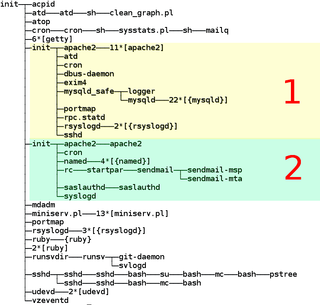Related Research Articles
A real-time operating system (RTOS) is an operating system (OS) for real-time computing applications that processes data and events that have critically defined time constraints. An RTOS is distinct from a time-sharing operating system, such as Unix, which manages the sharing of system resources with a scheduler, data buffers, or fixed task prioritization in a multitasking or multiprogramming environment. Processing time requirements need to be fully understood and bound rather than just kept as a minimum. All processing must occur within the defined constraints. Real-time operating systems are event-driven and preemptive, meaning the OS can monitor the relevant priority of competing tasks, and make changes to the task priority. Event-driven systems switch between tasks based on their priorities, while time-sharing systems switch the task based on clock interrupts.

In computing, a process is the instance of a computer program that is being executed by one or many threads. There are many different process models, some of which are light weight, but almost all processes are rooted in an operating system (OS) process which comprises the program code, assigned system resources, physical and logical access permissions, and data structures to initiate, control and coordinate execution activity. Depending on the OS, a process may be made up of multiple threads of execution that execute instructions concurrently.

In computing, load balancing is the process of distributing a set of tasks over a set of resources, with the aim of making their overall processing more efficient. Load balancing can optimize the response time and avoid unevenly overloading some compute nodes while other compute nodes are left idle.
Processor affinity, or CPU pinning or "cache affinity", enables the binding and unbinding of a process or a thread to a central processing unit (CPU) or a range of CPUs, so that the process or thread will execute only on the designated CPU or CPUs rather than any CPU. This can be viewed as a modification of the native central queue scheduling algorithm in a symmetric multiprocessing operating system. Each item in the queue has a tag indicating its kin processor. At the time of resource allocation, each task is allocated to its kin processor in preference to others.
In computing, scheduling is the action of assigning resources to perform tasks. The resources may be processors, network links or expansion cards. The tasks may be threads, processes or data flows.

Round-robin (RR) is one of the algorithms employed by process and network schedulers in computing. As the term is generally used, time slices are assigned to each process in equal portions and in circular order, handling all processes without priority. Round-robin scheduling is simple, easy to implement, and starvation-free. Round-robin scheduling can be applied to other scheduling problems, such as data packet scheduling in computer networks. It is an operating system concept.
MapReduce is a programming model and an associated implementation for processing and generating big data sets with a parallel, distributed algorithm on a cluster.
In computer science, a multilevel feedback queue is a scheduling algorithm. Scheduling algorithms are designed to have some process running at all times to keep the central processing unit (CPU) busy. The multilevel feedback queue extends standard algorithms with the following design requirements:
- Separate processes into multiple ready queues based on their need for the processor.
- Give preference to processes with short CPU bursts.
- Give preference to processes with high I/O bursts.
In computer science, an input queue is a collection of processes in storage that are waiting to be brought into memory to run a program. Input queues are mainly used in Operating System Scheduling which is a technique for distributing resources among processes. Input queues not only apply to operating systems (OS), but may also be applied to scheduling inside networking devices. The purpose of scheduling is to ensure resources are being distributed fairly and effectively; therefore, it improves the performance of the system.
In computer science, stream processing is a programming paradigm which views streams, or sequences of events in time, as the central input and output objects of computation. Stream processing encompasses dataflow programming, reactive programming, and distributed data processing. Stream processing systems aim to expose parallel processing for data streams and rely on streaming algorithms for efficient implementation. The software stack for these systems includes components such as programming models and query languages, for expressing computation; stream management systems, for distribution and scheduling; and hardware components for acceleration including floating-point units, graphics processing units, and field-programmable gate arrays.
Fair queuing is a family of scheduling algorithms used in some process and network schedulers. The algorithm is designed to achieve fairness when a limited resource is shared, for example to prevent flows with large packets or processes that generate small jobs from consuming more throughput or CPU time than other flows or processes.

OpenVZ is an operating-system-level virtualization technology for Linux. It allows a physical server to run multiple isolated operating system instances, called containers, virtual private servers (VPSs), or virtual environments (VEs). OpenVZ is similar to Solaris Containers and LXC.

In computer architecture, multithreading is the ability of a central processing unit (CPU) to provide multiple threads of execution concurrently, supported by the operating system. This approach differs from multiprocessing. In a multithreaded application, the threads share the resources of a single or multiple cores, which include the computing units, the CPU caches, and the translation lookaside buffer (TLB).

The Completely Fair Scheduler (CFS) is a process scheduler that was merged into the 2.6.23 release of the Linux kernel and is the default scheduler of the tasks of the SCHED_NORMAL class. It handles CPU resource allocation for executing processes, and aims to maximize overall CPU utilization while also maximizing interactive performance.

The Brain Fuck Scheduler (BFS) is a process scheduler designed for the Linux kernel in August 2009 based on earliest eligible virtual deadline first scheduling (EEVDF), as an alternative to the Completely Fair Scheduler (CFS) and the O(1) scheduler. BFS was created by an experienced kernel programmer Con Kolivas.

The Slurm Workload Manager, formerly known as Simple Linux Utility for Resource Management (SLURM), or simply Slurm, is a free and open-source job scheduler for Linux and Unix-like kernels, used by many of the world's supercomputers and computer clusters.

SCHED_DEADLINE is a CPU scheduler available in the Linux kernel since version 3.14, based on the Earliest Deadline First (EDF) and Constant Bandwidth Server (CBS) algorithms, supporting resource reservations: each task scheduled under such policy is associated with a budget Q, and a period P, corresponding to a declaration to the kernel that Q time units are required by that task every P time units, on any processor. This makes SCHED_DEADLINE particularly suitable for real-time applications, like multimedia or industrial control, where P corresponds to the minimum time elapsing between subsequent activations of the task, and Q corresponds to the worst-case execution time needed by each activation of the task.
Earliest deadline first (EDF) or least time to go is a dynamic priority scheduling algorithm used in real-time operating systems to place processes in a priority queue. Whenever a scheduling event occurs the queue will be searched for the process closest to its deadline. This process is the next to be scheduled for execution.

Apache Spark is an open-source unified analytics engine for large-scale data processing. Spark provides an interface for programming clusters with implicit data parallelism and fault tolerance. Originally developed at the University of California, Berkeley's AMPLab, the Spark codebase was later donated to the Apache Software Foundation, which has maintained it since.
Dominant resource fairness (DRF) is a rule for fair division. It is particularly useful for dividing computing resources in among users in cloud computing environments, where each user may require a different combination of resources. DRF was presented by Ali Ghodsi, Matei Zaharia, Benjamin Hindman, Andy Konwinski, Scott Shenker and Ion Stoica in 2011.
References
- ↑ Opinions (2018-11-21). "Top Interview Questions For A Data Engineer Job Profile". Analytics India Magazine. Retrieved 2021-12-15.
- ↑ "Judy Kay: FairShare Scheduler". Judy Kay.